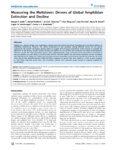TO
1 - 25 of 5
| Creator | Title | Description | Subject | Date | ||
|---|---|---|---|---|---|---|
| 1 |
 | Jorgensen, Erik; Carroll, Dana | Gene activation using FLP recombinase in C. elegans | The FLP enzyme catalyzes recombination between specific target sequences in DNA. Here we use FLP to temporally and spatially control gene expression in the nematode C. elegans. Transcription is blocked by the presence of an "off cassette" between the promoter and the coding region of the desired pro... | 2008 | |
| 2 |
 | Dale, Colin; Babst, Markus | Quorum sensing primes the oxidative stress response in the insect endosymbiont, Sodalis glossinidius | Sodalis glossinidius, a maternally transmitted bacterial endosymbiont of tsetse flies (Glossina spp.), uses an acylated homoserine lactone (AHL)-based quorum sensing system to modulate gene expression in accordance with bacterial cell density. The S. glossinidius quorum sensing system relies on the... | Endosymbionts; Sodalis glossinidius; Quorum sensing; Oxidative stress response | 2008 |
| 3 |
 | Ehleringer, James R. | Simplified GIS approach to modeling global leaf water isoscapes | The stable hydrogen (d2H) and oxygen (d18O) isotope ratios of organic and inorganic materials record biological and physical processes through the effects of substrate isotopic composition and fractionations that occur as reactions proceed. At large scales, these processes can exhibit spatial predic... | Oxygen isotope ratio; Hydrogen isotope ratio; Leaf water isoscapes; GIS | 2008 |
| 4 |
 | Goller, Franz | Superfast vocal muscles control song production in songbirds | Birdsong is a widely used model for vocal learning and human speech, which exhibits high temporal and acoustic diversity. Rapid acoustic modulations are thought to arise from the vocal organ, the syrinx, by passive interactions between the two independent sound generators or intrinsic nonlinear dyna... | Vocal muscles; Syringeal muscles; Sturnus vulgaris | 2008 |
| 5 |
 | Sekercioglu, Cagan | Measuring the meltdown: drivers of global amphibian extinction and decline | Habitat loss, climate change, over-exploitation, disease and other factors have been hypothesised in the global decline of amphibian biodiversity. However, the relative importance of and synergies among different drivers are still poorly understood. We present the largest global analysis of roughly ... | 2008-01-01 |
1 - 25 of 5
